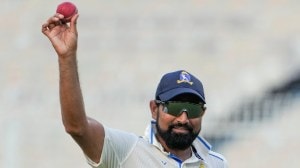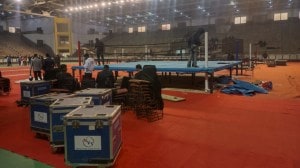It146;s great cricket, but remember It146;s just cricket
When we got the news in Pakistan that the Indian government had given the go-ahead for the cricket tour, a cheer went up. There was an even ...

When we got the news in Pakistan that the Indian government had given the go-ahead for the cricket tour, a cheer went up. There was an even louder cheer when our newspapers prominently displayed Sachin Tendulkar8217;s statement that he was available for the tour.
And he made eminent good sense when he said that he expected a good contest but, cricket-wise, did not think that it was going to be very different from other commitments. He put the tour in its proper perspective. The cricket rivalry between the two countries is confined to the cricket field. My friend Jagmohan Dalmiya hit the nail on its head when he told the BBC in a radio interview: 8216;8216;We are going to play a game of cricket, we are not going to fight a war.8217;8217;
The tour is on but the itinerary has yet to be finalised. Karachi and Peshawar appear to be sticking points as venues as the three-man delegation that visited Pakistan appear to have reservations about the duration of the team8217;s stay in these cities.
This seems to me to be bureaucratic nit-picking. If a venue is safe for an ODI, it is safe for a Test match. What has the duration of stay of a team8217;s visit got to do with security? The same tight security will be available for both occasions. It will not be relaxed. I hope that this logic will prevail.
We have come a long way and, given goodwill on both sides, it is amazing what can be achieved in such an astonishingly short time. There has been a great deal of public support, on both sides of the border, for the cricket tour.
Yet it seemed, even at this late hour, that it was spinning out of control with politicians weighing in and the media going into a feeding frenzy. There were alarming security concerns and some kite-flying about specific threats to Indian players, notably Tendulkar and Ganguly. There was one outlandish concern expressed by a supposedly responsible politician who felt that it was necessary to re-think the tour following the recent happenings in Pakistan, mainly with regard to the exposure of nuclear proliferation by Pakistani scientists!
Not just the Pakistan Cricket Board, which is feverishly busy with making arrangements for the tour the media list alone is a scroll that would fill many pages but the cricket public that is looking forward with trembling anticipation to the tour was dismayed. To its credit, the Indian government was not railroaded and, in what is seen in Pakistan as an act of statesmanship, gave the go-ahead. Public opinion had linked arms with political expediency. The voices of the cricket fans had been heard.
The Pakistan players are over the moon. Some of them were in the team that toured India in 1999. They told me that they had been tense and worried about their safety. Security had been tight but they had had complete confidence in the arrangements that had been made and they got over their fears and they were able to focus on their cricket and, at the same time, enjoy themselves.
We should not lose sight of the fact that security concerns both the teams. One cannot be made a target without the other too being affected. Both teams are on the same ground and will be staying in the same hotel and will be attending social functions, if any are planned. If any risks are involved, players of both teams will be exposed to them.
There should be no doubts in Indian minds. Their team will be get a rousing welcome when it arrives in Pakistan, if security will allow it. But the welcome will be sincere. Naturally, we would want to win 8212; not because it is India but because it is one of the best teams in the world. Tendulkar, Ganguly, Dravid, Sehwag are household names in Pakistan and there is a passion for cricket in Pakistan that transcends national boundaries.
At our grounds, the crowds will be partisan but this does not mean that the deeds of the Indian cricketers will go unappreciated. The mood in Pakistan is upbeat.
- 01
- 02
- 03
- 04
- 05






























